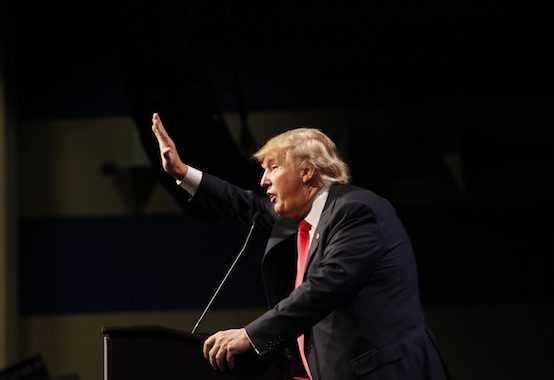Could Trump “Run the Table?”

That’s the question I ask in my latest column at The Week. As you might guess, my answer is affirmative.
The usual response to these sorts of claims is that polling this far out doesn’t really mean much. Contests can get especially volatile as we approach an election date, nobody is paying attention yet, and Trump is riding primarily on name-recognition. But the distinctive feature of the 2016 Republican primary polling has not been its volatility but its stability — at least at the top, where Trump sits.
Volatility in recent prior GOP primary contests has been driven by dissatisfaction with the presumptive nominee: McCain in 2008 and Romney in 2012. But there is no establishment candidate or presumptive nominee to be dissatisfied with this time. Instead, there’s a candidate from far outside that establishment, who is running explicitly against that establishment, but not running a particularly ideological campaign — certainly not one that lines up with traditional conservative shibboleths (which is what Cruz is doing). The extraordinary stability of the Trump vote may be a sign not merely of the high name-recognition of the candidate, but the wide and deep appeal of that stance — or of Trump personally.
And if voters in later states aren’t paying attention yet, then what will cause them to pay attention? Primarily, the results of the early contests. Primary contests are partly ways of signaling to the partisan electorate who they are supposed to vote for. So early Trump victories could well signal to the less-engaged portions of that electorate that the party has decided — and decided for Trump. Even though, in the minds of those supposedly in charge of the party, they most certainly haven’t.
Cruz is the only challenger to Trump who has gotten any kind of traction, but his rise has been overwhelmingly on the right, a path that numerous insurgents have taken and failed in. Maybe he’ll succeed this time — but why assume that Trump will be easier to defeat in this manner than candidates who were manifestly more disliked by the rank-and-file GOP electorate? Isn’t it more likely that, if voters in New York or Pennsylvania see their choice as “Trump or Cruz or some loser,” they’ll mostly go for the angry but non-doctrinaire Trump?
The rest of the crowd of candidates needs to take advantage of the nomination’s “blue wall” that supposedly stops conservative candidates from winning. But Trump already has the advantage in scaling that wall. His strongest regions are the Northeast and Midwest. He polls just as well among self-described moderates as among self-described conservatives.
The mainstream candidates can’t get any traction because Trump is ahead of them in their lane, while Cruz is the classic ideological conservative challenger. How does that story — a stronger-than-usual poll-leader blocking the moderate path to the nomination, and a more-divisive-than-usual candidate playing conservative insurgent — not imply that the less-ideological but charismatic poll leader is the favorite to win?
If Trump wins Iowa – as very he well may – that could badly hobble Ted Cruz, his strongest challenger to date. After that, he’d be strongly favored to win New Hampshire (as he is regardless).
That’s far from certain to happen, of course. But if it did happen, it would be unprecedented. No GOP candidate has won both the Iowa caucuses and the New Hampshire primary since the dawn of the modern primary system. Not Nixon in 1968. Not Reagan in 1980. And not Bush in 2000.
And given that Trump is currently leading in the polls of basically every state after the first two, why wouldn’t the streak continue after a start like that?
You know, did warn us we’d get bored with winning.
Comments